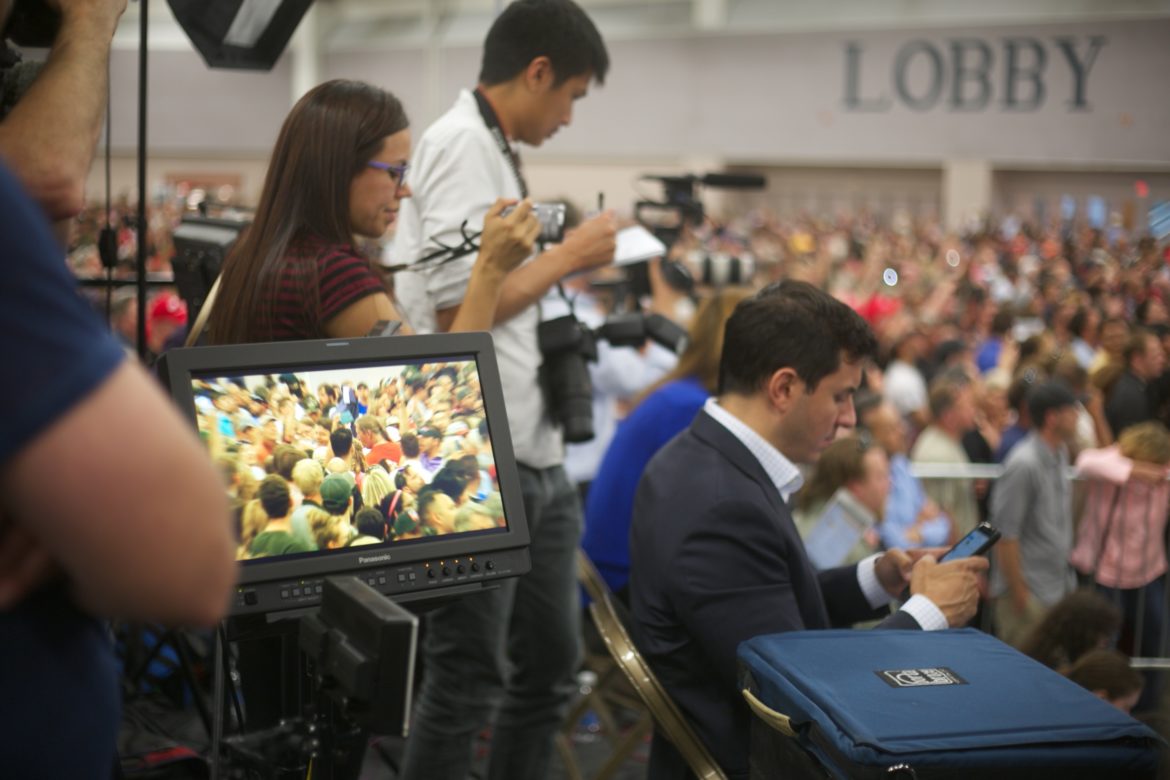In one of the most contested presidential election in recent times, the national media has been under fire too.
Media outlets may have covered the story to the best of their ability, but complaints about biased coverage have not been absent. National print and online publications as well as major TV networks have been accused of favoring one or the other candidate. In fact, the media coverage has become part of the discussion in this year’s election.
Is the media really biased?
Data journalists at The Data Face analysed headlines over one year (July 2015-July 2016) from eight major media outlets. They found Donald Trump has headlined 14,924 articles, more than twice as many headlining Hillary Clinton.
The study also found media coverage depends on salient events which is why the coverage varies over time.
El Paso Times Editor Robert Moore believes journalists just doing their job can sometimes create that impression. Ebbs and flows in coverage can cause people to think that the media coverage is not neutral, or affect voter’s perception of a candidate.
“Nationally media coverage is not biased, but there are individual journalists covering what they are suppose to, which causes people to think that the media is biased,” Moore said.
Sabine Hirschauer, a NMSU Government professor, believes Trump used the media wisely during much of this year’s primary election because he didn’t have to pay for many ads.
“He used the media, now he complains the media is biased,” Hirschauer said. “Primary coverage helped his campaign to the forefront of this year’s election. I don’t think it’s rigged.”
Moore says voters often stick to their opinion and if the media doesn’t say something similar, voters will see it as bias.
“An existing opinion that a voter has, can cause them to think that the media is biased because the media is not saying what they think,” Moore said.
Extensive media coverage of a candidate may also be linked to ratings.
Danny Trujillo, Las Cruces Police Department public information officer, says that at the beginning of the election, the coverage for Trump was big because he brought a lot of attention due to his comments at the rallies.
“Trump was the new kid on the block, he said a lot of things that helped him get coverage from the media, which eventually boosted ratings for many media outlets,” Trujillo said. “The things he said were newsworthy, but now that the media is covering his comments about women, he wants the media to also cover Clinton’s email scandal.”
Hirschauer believes Trump’s star power has helped him gain coverage from the media during his rallies.
“Trump… is turning politics into a reality T.V. show because he is a celebrity,” Hirschauer said.
Mainstream media helps candidates stay in the public eye for good or bad. Covering a candidate so much can cause people to think that a certain media outlet is biased.
Jeff Zucker, CNN President, told students at Harvard Kennedy School on Oct. 14 that it was a mistake to air so many Trump campaign rallies, according to Chicago Tribune.
“If we made any mistake last year, it’s that we probably did put on too many of his campaign rallies in those early months and let them run,” Zucker said.
Ratings are a big thing for media outlets. Moore believes that ratings are like drugs for broadcast media because they are hard to break away from.
“The CNN president coming out and saying this was shocking because those types of media depend on ratings,” Moore said. “It was a good point that he brought up because they covered Trump early in the election which didn’t make people think that they were being biased in any form.”
For those that aren’t familiar with media, it can look as if the media is favoring one candidate over the other. But Moore downplays the impact of the media.
“The media doesn’t control if the polls move one way or another, the media is covering the story,” he said.
Editor’s Note: This article was produced in partnership with the New Mexico State University journalism program.

So, you asked the media if the media was biased, and they said no, and you’re done? Good thing the media isn’t biased, or this story might look a little one-sided, particularly in it’s interpretation of what the one statistic offered means. I really expected more from you.